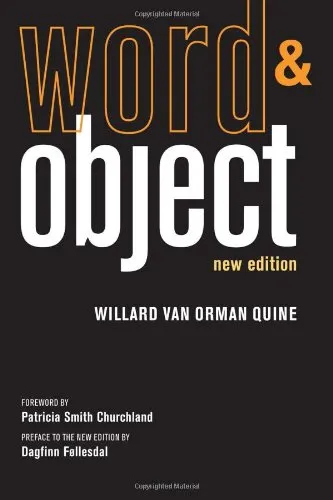Word and Object
4.5
Reviews from our users

You Can Ask your questions from this book's AI after Login
Each download or ask from book AI costs 2 points. To earn more free points, please visit the Points Guide Page and complete some valuable actions.Welcome to the intricate world of semantics and ontology as explored in 'Word and Object,' a seminal work by Willard Van Orman Quine. As you delve into this comprehensive introduction, you'll discover the crucial ideas and philosophical innovations that have made this book a cornerstone in the fields of language, knowledge, and logic.
Detailed Summary of the Book
In 'Word and Object,' Quine challenges some long-standing assumptions about the relationship between language, reality, and cognition. The book is fundamentally an exploration of how we use language to make sense of the world, and how these linguistic frameworks both shape and reflect our understanding of reality.
One of the key ideas introduced in this book is the "indeterminacy of translation." Quine argues that there are multiple valid ways to interpret the meaning of a sentence in another language, and that there's no objective way to determine which translation is correct. This assertion questions the traditional idea of meaning as something fixed and transparent, suggesting instead that it's inherently relational and fluid.
Quine also introduces the idea of the "ontological relativity," which posits that our conceptual schemes—how we organize and interpret experiences—are deeply connected to our ontological commitments, or what we believe exists. He contends that the boundaries between subject and object, language and world, are not distinct and fixed, but are shaped by our linguistic practices.
'Word and Object' is divided into rigorous yet accessible sections, including discussions on behaviorism, the nature of meaning, and the analytic-synthetic distinction. Quine's arguments traverse an array of concepts from epistemology, logic, and philosophy of language, creating a rich tapestry that provokes and engages readers.
Key Takeaways
- Indeterminacy of Translation: Language does not have a one-to-one correspondence with reality; meanings can be multiple and interpretations manifold.
- Ontological Relativity: Our understanding of what exists is closely related to our use of language and conceptual frameworks.
- Analytic-Synthetic Distinction: Quine rejects the clear distinction traditionally made between analytic truths (true by definition) and synthetic truths (true by how they relate to the world).
- Behaviorist Approach: Emphasizes that meanings are not intrinsic but behaviorally observable connections between speakers and their environment.
Famous Quotes from the Book
"Language is conceived in sin and science is its redemption."
"To be is to be the value of a variable."
Why This Book Matters
Word and Object remains a pivotal contribution to the philosophy of language and epistemology. It challenges the reader to contemplate the complexities and subtleties of meaning. By questioning definitive conceptions of reality and language, Quine opens the door to a more pluralistic understanding of how knowledge is constructed.
Quine's work is not only foundational in its own right but has also spurred intense discussion and further study, compelling philosophers, linguists, and cognitive scientists to rethink their approaches to language and meaning. The arguments within 'Word and Object' are not just theoretical but have practical implications for how we engage with the world.
Its insights have influenced a broad spectrum of disciplines, underscoring the importance of viewing language as a dynamic and evolving tool for interaction and understanding rather than a static system of symbols. This book pushes the boundaries of what is conceivable in the realm of human cognition, making it an essential text for anyone interested in the intersection of language, thought, and reality.
Free Direct Download
You Can Download this book after Login
Accessing books through legal platforms and public libraries not only supports the rights of authors and publishers but also contributes to the sustainability of reading culture. Before downloading, please take a moment to consider these options.
Find this book on other platforms:
WorldCat helps you find books in libraries worldwide.
See ratings, reviews, and discussions on Goodreads.
Find and buy rare or used books on AbeBooks.
1280
بازدید4.5
امتیاز50
نظر98%
رضایتReviews:
4.5
Based on 0 users review
"کیفیت چاپ عالی بود، خیلی راضیام"
Questions & Answers
Ask questions about this book or help others by answering
No questions yet. Be the first to ask!


